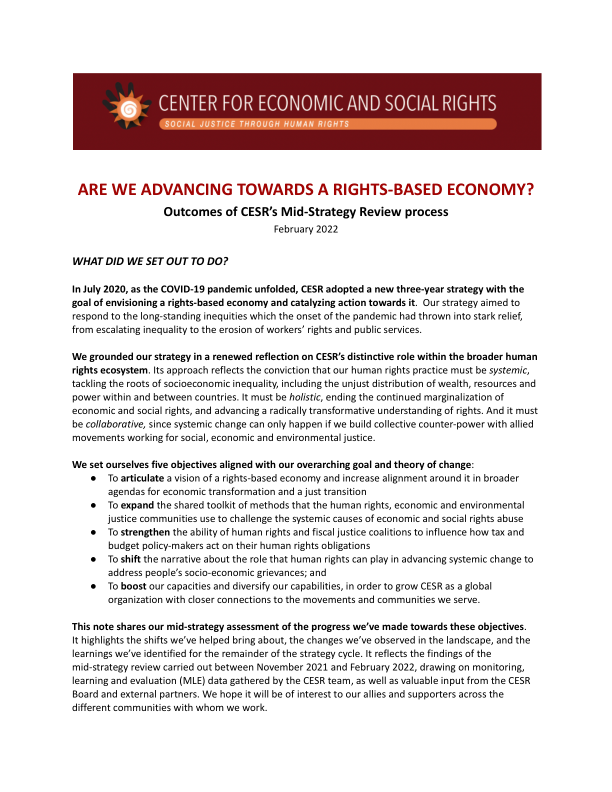
By: Rebecca Berger, Development Manager at CESR
More activists and organizations are increasingly incorporating a human rights lens into their work, boosting efforts to transform the dominant economic system.
In July 2020, CESR began an ambitious three-year strategy to envision a rights-based economy and catalyze action towards it. Forged as the pandemic was unfolding, our strategy aims to tackle the inequities it has surfaced through three interrelated shifts: increased mobilization across movements working for systemic economic change, greater responsiveness of key economic governance institutions, and an improved policy environment in which rights-based economic transformation can occur.
But how do we know if we are making progress towards these goals? To answer this question, we put in place systems and frameworks for monitoring, learning and evaluation (MLE). For organizations like CESR working to strengthen the civil society ecosystem or the capacity and responsiveness of policy-makers, measuring these dimensions of change can be notoriously challenging. The review process yielded rich insights into how we have advanced towards our goals, while also highlighting some obstacles that CESR, along with our greater communities of practice, have faced during the past year and a half.
The mid-strategy review identified a number of promising shifts CESR is seeing as a result of our work. Proponents for economic transformation are increasingly incorporating human rights tools and analysis into their demands. On issues from vaccine equity to tax abuse and debt reform, economic justice coalitions we’re part of have shown growing interest in engaging with human rights approaches and discourse. MLE feedback suggests that, for many activists, a rights framing helps shift the focus from charity to entitlement and build consensus around a common agenda. We’re seeing broader interest across movements in the role human rights can play in shifting the narrative around how the economy functions and for whom, with influential actors such as the UN High Commissioner for Human Rights beginning to embrace the concept of a “rights-based economy”.
CESR also distilled a number of challenges and learnings which will impact how we adapt our work and tactics for the remainder of the strategy period. A key learning is that amplifying civil society power, making institutions more responsive, and generating an improved policy environment have proven more difficult than we imagined in the current context. Insights that speak to this include:
-
New approaches are needed to build civil society counterpower in a fragmented, virtual environment. While many NGOs have faced additional political and logistical constraints in the pandemic context, an area to learn from is the resurgence of people’s movements, from Chile to India, linking rights and economic justice demands at the community level. This is prompting us to give even greater priority to fostering alliances with community-based organizations and social movements as driving forces of economic change.
-
The institutions most responsive to our advocacy messages are human rights oversight bodies which are not always the ones with the most influence over economic policy. We are learning that the best way for us to influence economic actors such as the IMF is to weave our rights-based arguments into the collective demands of broader economic justice coalitions.
-
Improvements in the global policy environment have been more superficial than structural. From vaccine access to tax and climate justice, our findings underscored the role of corporate capture in thwarting international cooperation. A key learning for CESR here is that our advocacy must more directly address the skewed structures and dynamics of global economic governance, not only their unjust policy outcomes.
What does this all mean for CESR’s strategy going forward? We’ve identified five areas where we intend to make adaptations in order to meet the goals we have set for ourselves. Over the next 18 months, you will see us:
-
Focusing our efforts by strengthening the synergies between our overarching work to design the blueprint for a rights-based economy, and our advocacy to advance fiscal justice and transform global economic governance.
-
Expanding our partnerships so as to forge deeper connections with community-based groups and social movements, particularly those working for environmental and climate justice.
-
Choosing our spaces selectively, mapping out priority advocacy spaces in the international human rights and economic governance spheres where our collective messages will have the most impact on narratives, norms, policies and practices.
-
Anchoring our advocacy in 2-3 in-depth country research and advocacy projects in contexts where CESR has close partnerships and increased presence, in order to support strategic national-level change and generate evidence to complement our global advocacy messages.
-
Challenging and changing ourselves as we act on the commitment to embody equity and justice in all aspects of our work and culture, as a growing organization with staff across five continents.
In undertaking this mid-strategy review, we wanted not just to assess progress on our goals, but also generate insights and learnings that can be shared throughout our community of practice. These learnings are not unique to CESR and we hope our allies in the struggle for rights-fulfillment and socioeconomic justice find them useful as well. We want to thank the partners and allies who we have worked with over this period and who contributed to this review. In the spirit of mutual learning, we hope that you take the time to read the full mid-strategy review outcome document and send any thoughts you have to learning@cesr.org.
